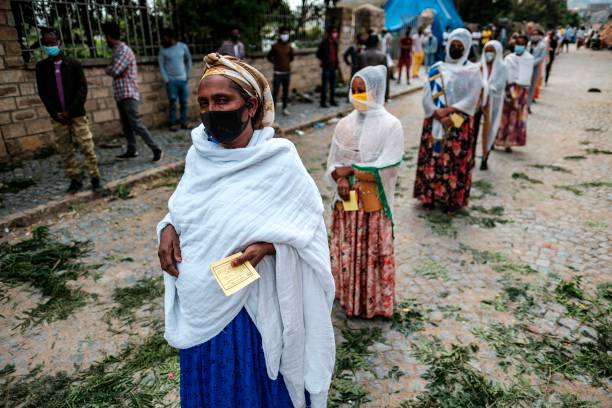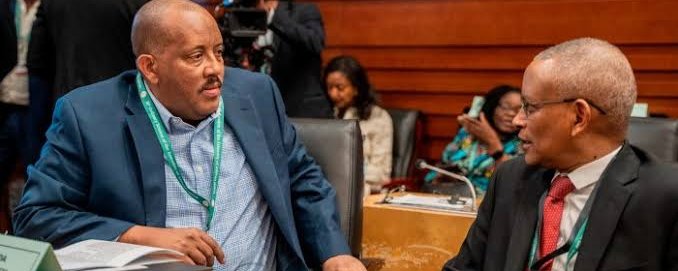Fleeing War – A Personal Experience


Stability in Ethiopia remains elusive as the country’s federal government, led by Abiy Ahmed’s Prosperity Party (PP) continues its dangerous political gambles and prepares for a looming war with Eritrea over access to the Red Sea. Tigray, having faced a genocidal war since 2020, is once again a potential battleground and pivotal player in the potential war. As such, the Ethiopian federal government has interfered with Tigray’s internal politics and leadership, seeking to reconfigure internal power structures in Tigray to consolidate a strong political base in preparation for the potential conflict with Eritrea. The threat of war has been substantiated by General Tsadkan Gebretensae, a former senior member of Tigray’s Interim Administration. He warned of the growing danger of war between Ethiopia and Eritrea “At any minute, there might be a war between Eritrea and Ethiopia.” Moreover, similar concern is also shared by Payton Knopf and Alexander Rondos who are the former US and EU special envoys to the region.
Political Fragmentation in Tigray and vulnerabilities
In November 2022, Tigray’s elected government, the Tigray People’s Liberation Front (TPLF) signed a Cessation of Hostilities Agreement (Pretoria Agreement), ending active armed conflict between Tigray’s Defense Forces and the Ethiopian National Defense Forces. After the signing of the Pretoria Agreement, the Tigray region entered a fragile recovery phase. However, internal divisions, driven by fears of accountability and corruption within the TPLF along with the administration of Prime Minister Abiy half hearted and opportunistic push for total victory by continuing a war of attrition, have kept Tigray and its people in a precarious position in an increasingly volatile geopolitical region.
The Pretoria Agreement established Tigray’s Interim administration. Getachew Reda, a former member and spokesperson of the TPLF, was appointed as head of the Interim administration. Since then, a schism between Debretsion, the Chairman of the TPLF and Getachew Reda and his allies has emerged, fracturing the region’s leadership capacity. The issue for disagreement goes beyond a struggle for power as it reflects deeper political and ideological differences, mainly in their visions for Tigray’s future. Getachew’s camp advocates for liberal democratic reforms and political pluralism, as demonstrated by his move to establish the Tigray Liberal Democratic Party after he was ousted from TPLF leadership, whereas Debretsion’s faction seeks to maintain the framework of revolutionary democracy, which remains the official program of the TPLF . Above all the underlying cause of the deepening divisions is the failure of implementation of the Pretoria Agreement. The Abiy Administration has not only contributed to this failure but also exploited it to deepen internal divisions to strengthen control over Tigray and use it for the potential war with Eritrea. Therefore, these internal divisions have left Tigray vulnerable to external manipulation.
Exploitation of vulnerabilities
A series of recent developments seem to suggest a coordinated effort by the Abiy Ahmed administration to support what has been branded as Getachew Reda’s faction of the Tigray leadership while undermining the Debretsion-led-TPLF. Given the rising tension in Tigray, Getachew was replaced as the President of the Interim administration by General Tadesse Worede. After Getachew was removed from the Tigray Interim Administration, Prime Minister Abiy Ahmed appointed Getachew as an advisor on East African Affairs under the federal government. This move has been seen widely as strategic and an attempt to exert influence in Tigray. In this new position, Getachew appears focused on helping Abiy’s administration by publicly accusing and discrediting claims of his former comrades. Now potentially with federal backing, Getachew has formed a new liberal political party aligned with the federal government’s liberal ideology. Such a move may serve the federal government’s interest in weakening the TPLF’s dominance by further fragmenting what was once a unified political base in Tigray .Furthermore, the National Election Board of Ethiopia (NEBE) canceled the legal status of the TPLF while Getachew Reda established a new political party for Tigray. The Authority for Civil Society Organizations (ACSO) also denounced the election of 12 members of the Tigray Development Association (TDA) board following criticism by Getachew, which undermines the TPLF influence over the organization.
Meanwhile, the newly appointed Tadesse Werede, a former military general and former deputy to Getachew Reda is seen as a favorable choice of the TPLF faction aligned with Debretsion, as he signaled by reversing Getachew’s earlier decision of expelling three Tigray army generals. This group includes individuals accused by Abraham Belay, Minister of Irrigation and Lowlands for collaborating with the Eritrean security apparatus to undermine the administration of Prime Minister Abiy. Moreover, Debretsion’s TPLF has been accused of having ties with Eritrea.
These developments are fueled by the Abiy administration’s ongoing failure or unwillingness to fully implement the Pretoria Agreement, particularly on critical provisions such as the restoration of Tigray’s territories and the resettlement of internally displaced persons (IDPs). In a recent parliamentary session on July 3rd, Prime Minister Abiy publicly signaled the possibility of a renewed and even more devastating war with Tigray. At the same time, Abiy’s government is facilitating the creation of an armed Tigrayan opposition in the Afar region; a clear violation of the Pretoria Agreement.
Thus, these events serve as indicators of the Federal government’s broader strategic intentions of exploiting the rift in Tigray’s leaderships to further weaken the region while potentially solidifying a loyal bloc ahead of future conflict scenarios. Therefore, both the federal government and the Eritrean regime may be exploiting internal divisions in Tigray to advance their own interests.
Getachew’s presence within Prime Minister Abiy’s political circle, along with involvement and role of other Tigrayan parties and PM Abiy’s own strategic interests to exploit the rift for his Red Sea ambition makes it complex to predict which political actors might side with PM Abiy or Isaias. Moreover, considering the Abiy administration’s war mongering and authoritarian posture, force and manipulation are seen as a golden key to solve all political problems.
Such a toxic political environment has deeply affected Tigrayan political parties, including newer opposition groups such as Baytona Party, the Tigray Independence Party (TIP), and Salsay Weyane Tigray, which could have played a constructive role in building democracy. Instead of engaging in productive problem solving to address the region’s urgent challenges, some of the parties have been exploited by both former partners in crime, the Eritrean and Ethiopian regimes and used as pawns in their power struggle. Ultimately, it is the ordinary people across the country and pro peace and democracy forces who continue to pay the price unless the Ethiopian public is mobilized to take back power through an organized and peaceful struggle
Considering the federal government’s track record, along with the characteristics of the PP’s leadership and conflict resolution approach, there is nothing to suggest that the federal government will take a different course. Instead it will continue its default and short-sighted ways of deception, militarism, and divide and rule tactics to resolve such complex domestic and geopolitical issues. Moreover, the absence of accountability and justice for the atrocities committed during the two-year war in Tigray could embolden PM Abiy’s administration to launch an offensive against Eritrea to gain control of the Red Sea by exploiting Tigray’s internal divisions.
Abiy’s Red Sea Ambition and Challenges
Despite PM Abiy’s strong self-aggrandizing attitude and apparent desire to be seen as a heroic figure, the aspiration for access to the Red Sea has long been a prominent political agenda in Ethiopia’s mainstream discourse. On several occasions, Prime Minister Abiy has portrayed Ethiopia’s port access as a life and death issue. In his speech on October 13, 2023, he stated Ethiopia has a “natural right” to access the Red Sea and denying this right would be unjust, proclaiming that “if there will be no fairness and justice and if there is no fairness and justice, it’s a matter of time, we will fight.” However, he recently ruled out the use of force after his failed attempt to secure a port with a de facto state Somaliland .
Though access to a port would indeed benefit the country from an economic and security standpoint, the timing is questionable. Most pressing economic and security problems inflicted by the repressive government itself should be the priority issue for any sensible leadership; nonetheless, Abiy is using the issue to revive his fading nationalist appeal to mobilize the public for another war.
In his pursuit of securing a port with Somaliland, he has made serious political miscalculations that weakened Ethiopia’s long standing geopolitical position by pushing Somalia to align closely with Egypt and Eritrea. Due to the government’s short sightedness and forceful behavior, Somalia has threatened to expel Ethiopia’s members of the AMISOM peacekeeping mission and replace it with Egyptian troops. In addition, Egypt is coordinating coastal countries, including the two hostile countries Eritrea and Djibouti, to work together and claim exclusive authority over Red Sea affairs in hopes of alienating Ethiopia.
Elsewhere, Eritrea is also ratcheting up support for anti-Abiy administration rebel forces in Ethiopia. The recent defection of Ibrahim Osman Aliyu, a prominent Afar political figure to Eritrea is one example. Also, considering Eritrea’s previous track record, there is a significant possibility of the country working with armed movements in Amhara, Oromia, and some elements in Tigray, if not already started yet.
Therefore, by observing the Ethiopian government’s broader conflict resolution strategies and the recent developments in Tigray, particularly the controversy over the renewal of TPLF’s party status and the internal rifts among the Tigrayan leadership, we can establish that there are strong signs that Abiy may be preparing for renewed conflict with Eritrea, which would unfortunately make Tigray the battleground for the second time.
A solution?
So, what’s the solution? Unfortunately, there is no silver bullet due to the complex nature of the issue. Nevertheless, understanding of two issues can be a pillar to design effective solutions. First, Tigray’s territorial and political demands can not be solved in isolation from the country’s political circumstances. A collaborative and inclusive political coordination framework should be established in which all Tigrayan democratic forces can work together with other Ethiopian political actors that are willing and capable of committing to a shared baseline political agenda. The baseline agenda of the alliance would be to exert sustained, versatile, and intensified nonviolent political pressure to replace Abiy’s regime and lay the groundwork for establishing a transitional government which upholds the existing constitution fundamentals. Additionally, democratizing Tigray by allowing other political parties to operate freely and engage in decision making processes would help strengthen the leadership by reducing its vulnerability to pressures from Federal government and other external forces, in turn reducing the threat of renewed war.
Second, there must be a clear understanding among the majority of the general public and political actors that the issue of port access cannot be sustainably resolved through force, particularly with Eritrea. Rather encouraging Eritrean democratic forces such as Eritrean Blue Revolution Front (EBRF) and individual political actors that believe in a win-win approach would be a step forward to a more viable solution.
Disclaimer: All views expressed in this article, or other articles posted at Omna Tigray, do not represent the official position of Omna Tigray.
Dr Alula Nerea – Omna Tigray External Contributor, August 2025